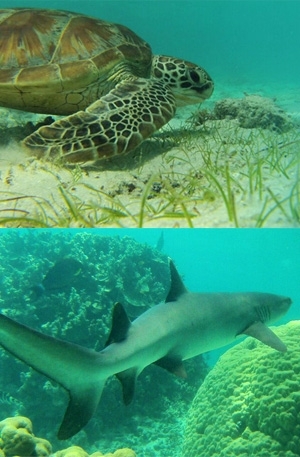Ocean predators help to prevent climate change
Research news
Sharks might have a bad name, but, in fact, they are unlikely heroes protecting the Earth from the perils of climate change – and their decline in numbers is serious cause for concern.
According to a team of Deakin scientists, the loss of sharks through hunting is causing instability in the ocean’s natural food chain and leading to the release of carbon from the seafloor and coastal zones into the atmosphere.
In a paper published in “Nature Climate Change,” the research team argue “that the functional loss of predators could have far-reaching consequences on carbon cycling and, by implication, our ability to ameliorate climate change impacts.”
With fewer sharks in the food chain, populations of the predator’s food sources, such as sea turtles and dugongs, flourish. One of the sea turtles’ main food sources is seagrass, which stores vast reservoirs of carbon within sediments.
With more sea turtles consuming more seagrass, the carbon that has been locked away for millennia is unlocked and released into the earth’s atmosphere, thereby accelerating climate change.
After examining available data from across the world, the team from Deakin’s Centre for Integrative Ecology, within the School of Life and Environmental Sciences, is now calling for urgent research to further investigate the consequences of shark-culling practises throughout the earth’s oceans – and is seeking stronger conservation efforts and stricter fishing regulations, to reinstate the important role that predators play in the ocean’s carbon cycle.
The team includes Deakin’s Dr Peter Macreadie, Dr Euan Ritchie and Professor Graeme Hays. Dr Macreadie said that more than 100 million sharks are being killed in fisheries each year.
“For a long time, we’ve known that changes to the structure of food webs – particularly due to loss of top predators such as sharks – can alter ecosystem function,” Dr Macreadie said.
“We call this consequence a trophic meltdown. The loss of around 90 per cent of the ocean’s top predators from across the globe has caused widespread trophic meltdowns.
"There are multiple ecosystems where meltdown can occur, but the most profound examples occur in the coastal zone, within seagrass, saltmarsh, and mangrove ecosystems – commonly known as ‘blue carbon’ ecosystems.
“In terms of understanding their environmental importance, these ecosystems have been under the radar of public attention. They are not coral reefs. They are seagrasses, saltmarshes, mangroves and swampy wetlands, which have not been considered attractive or useful. Yet, over geological time, they have been storing massive amounts of carbon and their loss could be a ticking time bomb.”
Dr Macreadie said, as one example, trophic meltdown has occurred in Shark Bay, Western Australia, where fewer sharks, as a result of hunting, has led to carbon storage rates less than half the amount of areas where there is shark abundance.
As another example, "a 1.5-square-kilometre die-off of saltmarsh in Cape Cod, Massachusetts – caused by recreational overharvesting of predatory fish and crabs – freed around 248,000 tonnes of below-ground carbon."
The researchers claim that "if only one per cent of the global area of blue carbon ecosystems were affected by trophic cascades… this could result in around 460 million tonnes of CO2 being released annually, which is equivalent to the annual CO2 emissions of around 97 million cars, or just a bit less than Australia’s current annual greenhouse gas emissions.”
In fact, the actual percentage of blue carbon ecosystems being affected by trophic cascades could be as high as 50 per cent.
This research is the first to explicitly link the loss of major ocean predators, including sharks and other top sea animals, to the loss of stored blue carbon. The researchers say that, while there is limited data on the topic, they believe further studies will reinforce their findings.
The research involved collaborators from the University of Queensland, the University of Western Australia, the University of Technology Sydney, Griffith University, Swansea University, Utah State University and Florida International University.
Read more:
- “Nature Climate Change”: ”Predators help protect carbon stocks in blue carbon ecosystems.”
- “The Conversation”: “Ocean predators can help reset our planet’s thermostat.”
Share this story
 Interconnected - sharks play a key role in controlling turtle populations and sea grass volumes.(Photos credit: Dr Peter Macreadie).
Interconnected - sharks play a key role in controlling turtle populations and sea grass volumes.(Photos credit: Dr Peter Macreadie).
